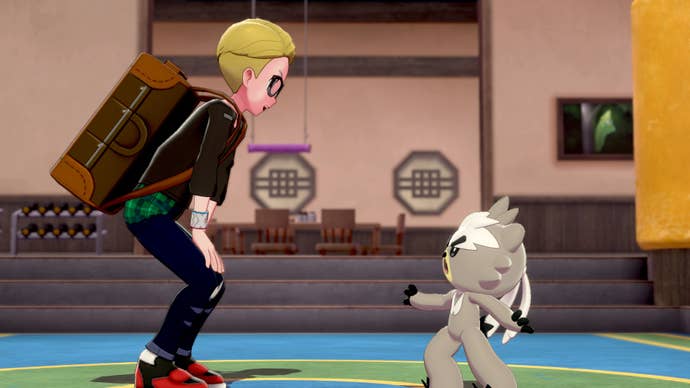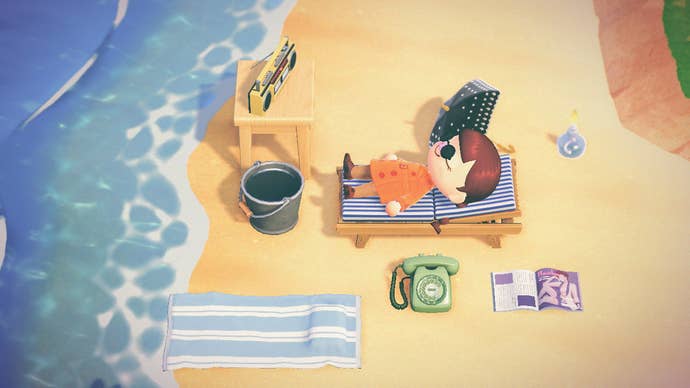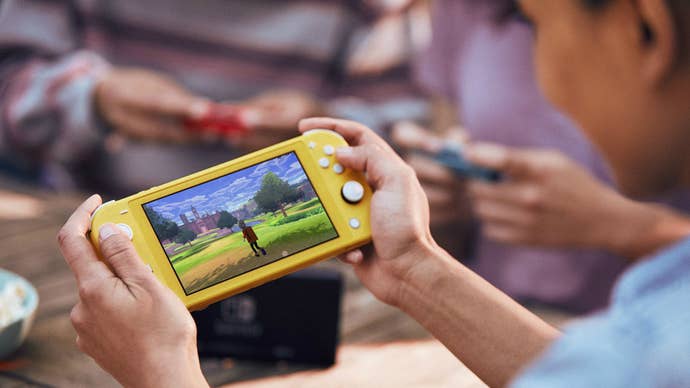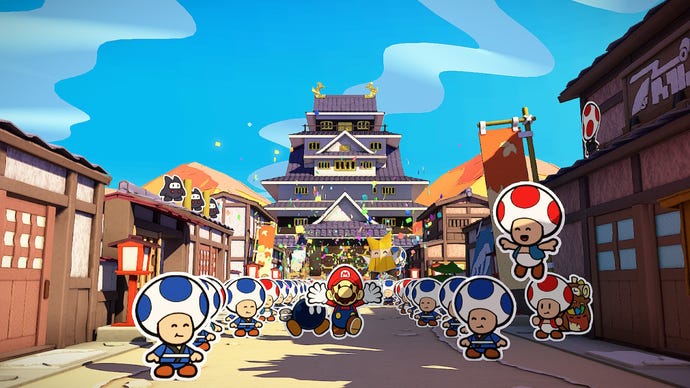Nintendo Has Had a Strange Year Even by the Standards of 2020
As the pandemic wears on and next-gen consoles approach, the Switch's release schedule is one big question mark.
This article first appeared on USgamer, a partner publication of VG247. Some content, such as this article, has been migrated to VG247 for posterity after USgamer's closure - but it has not been edited or further vetted by the VG247 team.
With today's release of Paper Mario: The Origami King, Nintendo's first-party lineup for the rest of 2020 is a void. We know Nintendo plans to release more games this year, and that it'll keep delivering updates for titles like Animal Crossing: New Horizons and Pokemon Sword and Shield. Production of Switch consoles is expected to return to pre-pandemic levels soon, Nintendo says. Beyond that, the rest of Nintendo's plans for the year are a mystery. Meanwhile, every week sees Microsoft, Sony, and major third-parties pinning down more release dates for fall and the holiday next-gen launches.
It seems all but certain that Nintendo has more planned for the 35th anniversary of Super Mario Bros. this September than a theme park, Lego sets, and a special edition of Monopoly. Prior to its official reveal in May, reports of a new Paper Mario were accompanied by rumors of 3D Mario remasters for the Switch due in 2020, most notably a deluxe version of Super Mario 3D World. But with just under half of the year left, Nintendo has yet to confirm any remasters or re-releases of any sort. With the near-term so impenetrable, it also seems safe to assume that titles like the Breath of the Wild sequel and Metroid Prime 4 remain a long ways off.

So, how did Nintendo end up at this particular midpoint in the year, and where is it going from here? If 2020 is now shaping up to be more of a quiet year for Nintendo, it's surely due in no small part to the impact of COVID-19. That said, it's worth taking a closer look at what we do and don't know about the pandemic's effects on Nintendo, and to also look back on how cautiously it was setting up expectations before the year began.
The Last Nintendo Direct
The last "proper" Nintendo Direct—not a "Mini" or one devoted to a single game or series—happened in September of last year, over 10 months ago. That showcase was explicitly said to focus on games coming in 2019, and while it had a couple reveals for 2020 in it—Deadly Premonition 2 and Xenoblade Chronicles: Definitive Edition—it was indeed mostly focused on a slew of ports and games scheduled for fall launches, among them Luigi's Mansion 3 and Pokemon Sword and Shield.
Already, Nintendo was being cautious in its messaging for 2020, and there's a very likely explanation as to why. By fall of 2019, it had already suffered a few prominent delays within the year. In January, Nintendo announced that Metroid Prime 4, first teased back at E3 2017, was being "restarted" with Retro Studios. Fire Emblem: Three Houses got pushed from an early 2019 launch into summer, leaving just Super Mario Maker 2 and Yoshi's Crafted World as the first half's brand-new releases (there was also New Super Mario Bros. U Deluxe). Then, at E3 2019, Animal Crossing: New Horizons was pushed to March 2020.
While New Horizons went on to outperform everyone's expectations thanks in large part to its timing with shelter-in-place orders, that June delay both led to fan dismay and saw Nintendo's stock market value plummet by more than $1 billion. Yes, even though the short tease for a Breath of the Wild sequel was unquestionably one of the year's E3 highlights, consumer hype didn't track with the response from investors.
If the rest of Nintendo's 2020 lineup will indeed be packed with re-releases, like the aforementioned 3D Mario titles or a "deluxe" version of Pikmin 3, then perhaps seeing yet another negative response to the delay of a big, new title made the company wary. Whether or not Nintendo had a solid release schedule planned, it could have decided then to keep things hushed to avoid another Metroid/Fire Emblem/Animal Crossing blowback. The seeds of Nintendo's quiet approach to 2020 may well have been sewn by mid-2019.
The Pandemic Looms Over Everything
In January, Japan became the second country outside of China to confirm its first case of COVID-19. By early February, Nintendo was already having to contend with the realities of the outbreak before it took hold globally-or before various health organizations knew enough about the virus's potential for asymptomatic spread to know it had arrived. First, Nintendo announced that the outbreak in China was limiting Nintendo's manufacturing of Switch units and peripherals for Japan. Then, a little over a week later, word came from Bloomberg that supply could be impacted for the U.S. and Europe as early as April.
By the time April arrived, we were over a week past the incredibly successful debut of Animal Crossing: New Horizons. It quickly became the Switch's biggest launch to date, and judging by its latest sales figures, Animal Crossing is likely the sixth highest selling game for Switch (fifth, if you break up Sword and Shield). The Animal Crossing phenomenon, pandemic constraints on supply, and—as Vice's Motherboard revealed later in the month—the advent of a bot for bulk-buying Switches all ended up kicking off the sustained Switch shortages we've seen over the last few months.
"The pandemic has had a big impact on consumer behavior in the world of gaming," NPD analyst Mat Piscatella tells USgamer. "We conducted a Gamer Segmentation Study in May 2020 that looked at how people are interacting with gaming and we found more people playing more games across more devices. So there has been an overall uplift to gaming engagement (and sales) during the pandemic."
"However, I don't think the data would suggest that Nintendo's business was more heavily impacted than some others," he adds. "Switch was already in a leading position going into the pandemic, and the launch of Animal Crossing: New Horizons really couldn't have come at a better time." According to NPD's June 2020 tracking report, released today, New Horizons is the second-best selling game of the year, only trailing Activision's Call of Duty: Modern Warfare, a multiplatform release.
After Animal Crossing's release, investors flocked to Nintendo. Come late April, Nintendo's stock had risen up 40%, nearing a 10-year high. By the middle of June, Nintendo stock crested at over 50,000 yen per share, a level not seen since the Wii's salad days in 2008.

Against the backdrop of global economic uncertainty, having a soaring stock price thanks to highly desirable products (thanks to an increase in supply, Ring Fit Adventure has also leapt back up the charts) is not a bad problem to have. Looking ahead to many more months, if not years of work and supply chain disruptions, though, Nintendo still has reason for caution.
As a massive company with studios, offices, and factories around the world, wherever COVID-19 policy falters or where recovery lags, Nintendo potentially has a problem. In Japan, with Nintendo's headquarters based in Kyoto and various satellite offices or subsidiary studios located there and in Tokyo, the pandemic has taken a very different course than it did in the U.S. and other hard-hit parts of the world. At the time of writing, Japan has reported fewer than 1,000 COVID-19 deaths, with just shy of 22,000 total cases confirmed.
That's a small, remarkable fraction of the cases and casualties seen in America. The numbers have flummoxed some experts, who observe that Japan did not take the same drastic response measures that other countries in the region did. Proportionally, Japan also has the oldest population in the world, with one in every five people over the age of 65. Undercounting is a possibility, but the fact that the virus has not torn through the country's strained elder-care homes is both a mystery and a blessing. Unfortunately, there are signs that the country may yet see an explosion in cases. Over the past week, Tokyo has seen record daily numbers of positive tests, prompting the city to raise its COVID-19 alert status to the highest level. Work-from-home is likely to persist.
While Nintendo has seen Switch production begin to rebound and expects it to normalize soon, it skipped over June for its annual E3-timed Direct presentation and warned that it "may not be able to proceed with the release of Nintendo products and the start of services" it originally planned for. "For what it's worth," wrote Niko Partners analyst Daniel Ahmad in May, "I've already heard that some Nintendo [first-party] games have been delayed internally or that there is uncertainty on release dates due to the challenges from COVID-19 and switch to work from home."
During a shareholder Q&A earlier this month, Nintendo executive Shinya Takahashi acknowledged development setbacks stemming from the pandemic, but said that plans through the rest of 2020 were still in shape. "While product development is a little behind schedule in some areas due to the impact of COVID-19, game releases planned for this fiscal year are currently not affected," he says. If Japan does end up seeing a second wave, or even a rise in cases that suggests the peak of a first, prolonged COVID-19 wave, Nintendo could easily see further negative impacts in the short term.
Nintendo is far from the only company facing challenges, of course. A new telework-focused survey conducted ahead of this summer's digital Game Developers Conference reveals some striking figures that point to issues for the game development at large. Some are more immediately concerning than others; among them, a third of developers report having projects delayed due to COVID-19. More troubling are the large numbers of developers who feel like their productivity and creativity have been negatively impacted by the transition to work from home. Many report working longer hours, too—lockdown is likely going hand-in-hand with an extended period of crunch for many developers aiming to release a game in the next year or two.
What's Next for Nintendo?
In light of all this information, and with only Nintendo's word (and lack thereof) to go on, there's good reason to believe that there are still first-party titles coming to the Switch later in 2020. The advantages of announcing its plans early could be outweighed by the risk of having to change them later.
"I don't think Nintendo is in all that unique a position when it comes to reluctance to lay out plans," Piscatella says. "It's wise to be cautious. Given the tremendous amount of uncertainty in the market, it makes more sense to continue to work quietly on what is planned to be released rather than lay out a timeline for games or services that may run into any of a number of challenges between now and launch."
The real question is whether Nintendo is quietly pushing off games it hoped to launch soon after 2020. Or perhaps it's readjusting the ambitions and scope of certain projects in order to ensure a consistent schedule of releases; one that might more easily withstand any further difficulties thrown up by COVID-19 later in the year.
"Given what's happening, it would be prudent to have multiple planning scenarios in place," says Piscatella. "So it would not surprise me if any or all companies have undergone reevaluation of their product lines or slates. [...] Ultimately, the games will determine the long-term success of Switch, or any system or service for the matter."

Nintendo's good fortunes with Animal Crossing and the Switch's general popularity aside, it is lucky that it doesn't necessarily need to be out there promoting things until it's good and ready. Microsoft and Sony have had to scramble to put together digital events for their respective next-gen lineups to wildly varying degrees of success. Nintendo, of course, is the undisputed king amongst the three when it comes to slick, hype-inducing digital showcases. No matter how troubling an empty-seeming back half of 2020 may be, there's an argument to be made that Nintendo shouldn't risk that reputation by rushing itself.
After all, you only need to look back one week to Nintendo's most recent Treehouse stream, which had speculation over a team-up with WayForward running wild until Nintendo issued a clarifying statement. People were quick to get their hopes up for a Micro-Mini Direct of sorts, when what they got were some nice folks with webcams revealing a Bakugan game. At the moment, Nintendo doesn't seem to need a constant, high-volume stream of excitement in order to keep selling Switches, and, when it does have a new bit of software or hardware that needs to hit big, it can be fairly sure that it will be met with eagerness and anticipation.
Mat Piscatella has a word to the wise for those pondering Nintendo's next steps: "All I know after 15 years or so in games analysis? Don't get in the habit of trying to predict what Nintendo is going to do."



